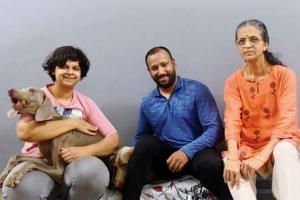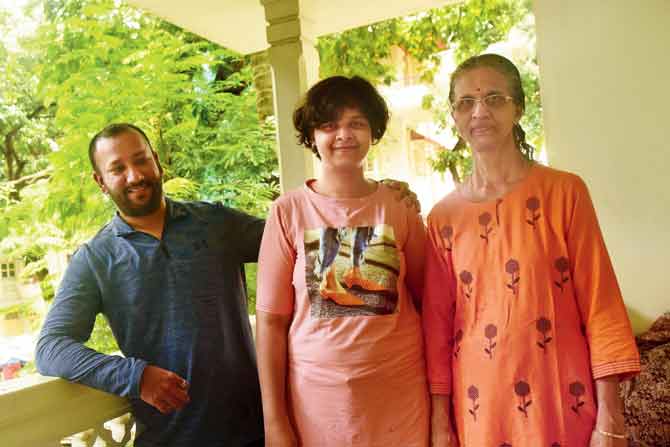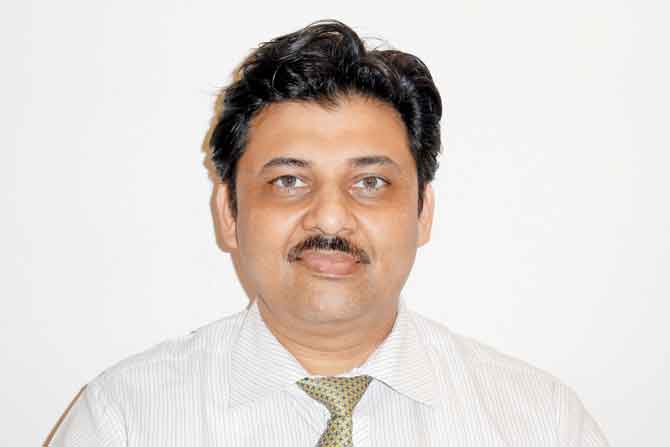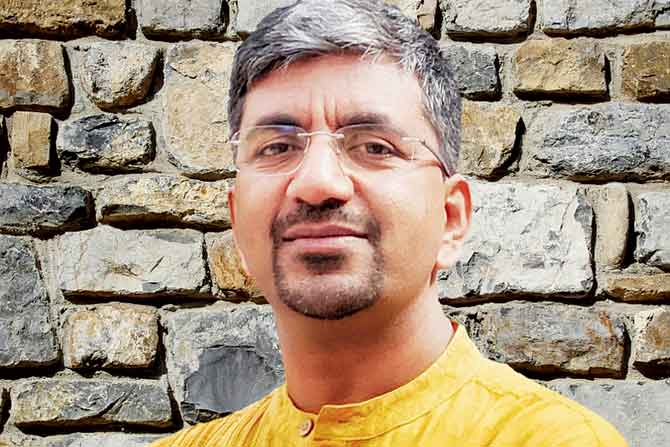As COVID-19 customises its attack, leaving bizarre after-effects, ranging from erratic menstruation to vibration feelings, doctors try to make sense of post-recovery struggle thats lasting months

(Right) Supriya Hattiangadi with daughter Pradnya and son-in-law Sanket at their Matunga residence. Hattiangadi tested positive for COVID-19 in May, but continues to experience symptoms of fatigue and muscle ache. Pic/ Suresh Karkera
Supriya Hattiangadi, 64, says her days have been packed since she retired from a banking job. She'd start with yoga every morning, cook meals for the family and then spend some down time with her pets, Kiss and Rory, while her daughter and son-in-law would be away at work.
ADVERTISEMENT
This was how it was until she tested positive for COVID-19 in the month of May. Unable to secure a hospital bed at the time, the family opted to quarantine her at their Matunga home. By the end of 14 days, her fever had subsided and the symptoms were waning. She felt like she was getting back to her old self. "When we checked with the doctors, her condition had begun to improve, so they said if she wasn't showing symptoms, she didn't need another test," says her daughter Pradnya, a canine
trainer involved in animal-assisted therapy.
Five weeks after "recovering", Hattiangadi says the symptoms continued to linger. "As recently as a fortnight ago, I was experiencing severe fatigue, soreness in the muscles and throat discomfort. I'm still not entirely okay," she says. There were days, when she would have sudden constipation. Still weak and shaky, she makes it a point to inform her family before she even goes to the bathroom. "I can't walk without feeling tired. I worry that I might collapse."

Supriya Hattiangadi (right) with daughter Pradnya and son-in-law Sanket at their Matunga residence. Pic/ Suresh Karkera
Hattiangadi is far from alone.
According to the World Health Organisation (WHO), Corornavirus patients typically recover from the infection in about two weeks' time. But, the Covid Symptom Study, undertaken by King's College London, has revealed that 10 per cent of all COVID-19 patients report symptoms for at least three weeks. The complicated recovery process has led to thousands of people sharing their stories on Facebook groups, including the Long Covid Support Group, which has more than 5,200 members. In May, a US-based writer, producer and yoga teacher, Fiona Lowenstein, who tested positive for COVID-19 on March 17, created the Body Politic COVID-19 Support Group after failing to find information about what she was experiencing. On May 11, the group published a report titled, 'What Does COVID-19 Recovery Actually Look Like? An Analysis of the Prolonged COVID-19 Symptoms Survey by Patient-Led Research Team.' The findings were based on survey responses from 640 people, and the report was created by volunteers from the support group. In an interview with Vox podcast, Reset, she said, "The first thing that became clear was that this experience of long recovery and lingering symptoms was very common, at least very common among the people joining our group." It's the reason they call themselves "long-haulers" as their symptoms persist long after the 14-day period that's officially said to be the average length of the illness.
Pradnya, who also experienced symptoms when her mother tested positive, says both she and her husband have faced debilitating fatigue since. "I've never had an irregular period, but after the infection, my menstrual cycle has been disrupted." Last month, she joined a webinar on PatientsEngage, an online healthcare platform that supports patients and caregivers in the holistic management of chronic conditions. "I had to share my experiences because the more we educate ourselves about it, the easier it will be for us to tackle the disease," she says.

Dr KK Aggarwal
There are a number of patients who have had COVID-19 for months, and experts are baffled as to why they can't shake off the disease. Dr KK Aggarwal, President of Confederation of Medical Associations of Asia and Oceania (CMAAO) and editor-in-chief at Medtalks, has treated over 3,000 patients until now. Roughly 20 per cent of his patients have complained of post recovery symptoms. "This virus has shown different faces; it behaves differently on different individuals. In some cases, it acts like a bacterial illness, which requires antibiotics. In other cases, it's behaving like the HIV infection and has the possibility of secondary opportunistic infection, an infection caused by pathogens (bacteria, viruses, fungi, or protozoa) that are more severe in people with weakened immune systems. In most cases, it is causing thrombo-inflammation, which means the body shows low-grade inflammation with tendencies for clot formation." He says if the inflammation occurs in the small intestine, it can cause recurrent diarrhoea, and if it's in the bladder, possibly, a urinary infection. "Throat inflammation can lead to a feeling of something being lodged in the throat. Loss of smell and taste is common too." His patients have complained of low-grade fever for a few hours in the day. According to Aggarwal, while most post viral illnesses remain up to 90 days, in the case of COVID-19, it's restricted to about 40 days.
A police officer from Dongri, who did not wish to be identified for the story, was admitted to the Najam Baug temporary quarantine facility after testing COVID-19 positive on June 19. She was discharged 10 days later. "With medication and yoga, I started feeling better. After discharge, I was given a three-day medicine course. My condition improved, so much so that I was confident I could resume duty within days. Out of nowhere, I started experiencing headaches and, all of a sudden, I would start to sweat and the blood pressure would drop." She visited her family doctor, who said she was experiencing the after effects of COVID-19 and prescribed multivitamins and advised rest. The officer hasn't resumed work, and is not sure when she might be able to. "I feel tired easily. I'm just wondering when this will end. Will I ever be able to work normally?" While a majority of patients who experience post recovery symptoms are in the 50-plus age group, the officer is in her late 30s.
The disruption of simple acts of daily living has left doctors the world over alarmed. The Dutch Living Foundation recently published a report after surveying 1,622 COVID-19 patients, who had reported enduring symptoms. Longfonds (Lung Foundation Netherlands) director Michael Rutgers says in the report that the health of many COVID-19 patients who have not been admitted to hospital is still 'frighteningly poor' after months. "Fatigue, shortness of breath, chest pressure, headaches, muscle aches: almost three months after the first symptoms are typical for the virus. No less than 95 per cent of those surveyed indicated that they had problems with simple daily activities. We're really shocked by this. More than six in 10 even have problems walking."

Chembur resident Manoj Bhavnani ended up with viral fever after recovering from COVID-19. He believes the virus has taken a toll on his general immunity
Chembur resident Manoj Bhavnani, who has been a swimmer all his life, decided to catch some fresh air after recovering from COVID-19. "I went out for a walk that week, ended up getting wet in the rain and I'm now down with a viral fever. Initially, I was mortified, because I thought it's a relapse, but it turned out to be a regular viral fever. I am not the sort of person to fall sick easily, but the disease seems to have taken a toll on my constitution." Dr Aggarwal says despite the appearance of a range of symptoms, the disease is not infectious at this stage. "This virus is dangerous and easily transmissible only on day four, five and six."

Dr Roy Patankar, gastroenterologist
COVID-19 has existed for less than six months, and there's very little we know about it. Roy Patankar, gastroenterologist and director of Zen Multispeciality Hospital, Chembur, says every day experts are making new discoveries about the long-term complications of the disease. Some of it, he calls "bizarre". "Normally, in a viral infection, you bounce back within 10 days. The symptoms we're seeing are out of proportion to the length of illness. A full-time surgeon working with us has not been able to step out of home even a month after infection. He walks for 15 minutes and he's tired, although his CT scan is normal." In children, the post recovery symptoms differ. "For some reason, they get an inflammation of the arteries all over the body and that can cause sudden death. It's called the Kawasaki disease. This was reported in patients at the Bai Jerbai Wadia Hospital for Children."
Another pattern that is emerging is post-COVID anxiety syndrome.
Dr Harish Chafle, consultant intensivist and chest physician, Global Hospital, thinks the symptoms are akin to Posttraumatic Stress Disorder (PTSD). "What we've observed among us is the lack of sleep, late night tremors and, sometimes, even depression. Neuropsychiatric manifestation and palpitation post recovery is common." In such cases, Chafle conducts a psychoanalysis followed by counselling. If it comes to adding a drug to the treatment, it's usually an anxiolytic to prevent anxiety. If that doesn't help, then a psychiatric referral.

Dr Shashikiran Umakanth, professor and head, department of medicine at Dr TMA Pai Hospital, Udupi, says the Guillain-Barré syndrome, Kawasaki disease and transverse myelitis are rare complications that develop after recovery from many viral infections, and they are possible with COVID-19 too. Although he hasn't noticed this in any of his patients, they have been reported in other countries
Dr Shashikiran Umakanth is professor and head, Department of Medicine at Dr TMA Pai Hospital, and Nodal Officer at a dedicated COVID-19 Hospital in Udupi. He believes the virus, in many ways, is just like any other, except it's highly contagious. "The closest virus to the COVID-19 is the common cold, which, by the way, is also a Coronavirus," he says. There are seven strains; the first four are the common cold, historically considered mild. The fifth was the SARS-CoV (Severe Acute Respiratory Syndrome in 2002), sixth is the MERS-CoV (Middle East Respiratory Syndrome in 2012) and the seventh is the SARS-CoV-2. "Any viral infection can produce complications because it messes with our immune system. Some viruses such as chikungunya and dengue are known to produce body ache and joint pain more than others. When it comes to COVID-19, patients may experience this, but it won't go on for a year, like it does in chikungunya. That said, there's a problem in concentration. Some patients are unable to browse mobile phones or read newspapers for more than a few minutes. Regarding the long-term implications [of the infection], we'll have to wait and watch."
Building a community
Several forums and social media groups have sprung up up to support long-haulers. The Body Politic COVID-19 support group has people reporting brain fogs and trouble concentrating. Some have experienced hallucinations and strange vibration sensations when they touch surfaces. Long COVID Support Group, a similar community on Facebook, has more than 5,200 members.
England launches help portal
The National Health Service England has launched a new service to help people deal with the long-term effects of the Coronavirus infection. Your COVID Recovery is a website for people in the UK to access tutorials and track their progress.The government has also announced an £8.4m study into its long-term impact health.
Catch up on all the latest Mumbai news, crime news, current affairs, and a complete guide from food to things to do and events across Mumbai. Also download the new mid-day Android and iOS apps to get latest updates.
Mid-Day is now on Telegram. Click here to join our channel (@middayinfomedialtd) and stay updated with the latest news
 Subscribe today by clicking the link and stay updated with the latest news!" Click here!
Subscribe today by clicking the link and stay updated with the latest news!" Click here!







